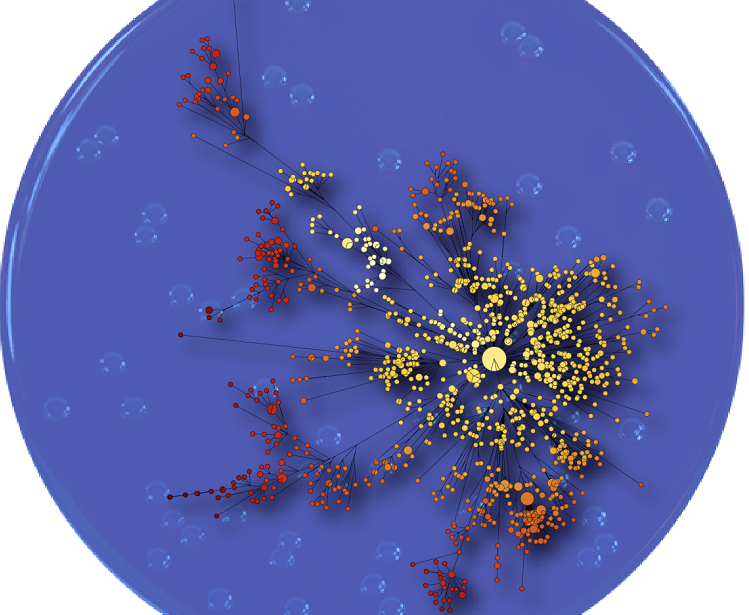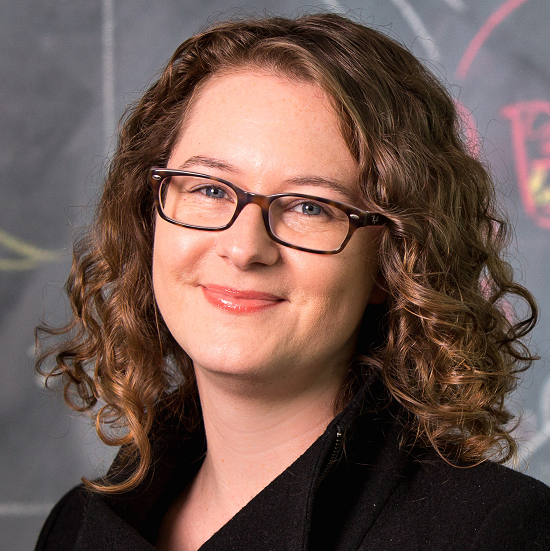Links to external sources may no longer work as intended. The content may not represent the latest thinking in this area or the Society’s current position on the topic.
The population structure of Escherichia - POSTPONED

This meeting is postponed. More details to follow.
Scientific meeting organised by Professor Mark Achtman FRS, Professor Kathryn Holt and Professor David Aanensen.
Escherichia includes commensal and invasive E. coli, Shigella, and multiple discrete species. >100,000 Escherichia genomes have been assembled by EnteroBase and 9,500 genomes that represent the entire diversity have been identified, the so-called EcoRPlus collection. Experts on all aspects of Escherichia will convene here to discuss creating an integrated scientific community for annotating the basic population structure of this genus.
Attending this event
This meeting is postponed. More details to follow.
Enquiries: contact the Scientific Programmes team.
Organisers
Schedule
Chair

Professor Mark Achtman FRS, University of Warwick, UK

Professor Mark Achtman FRS, University of Warwick, UK
Since 1965, Achtman has founded four highly distinct areas of bacterial genetics: 1) bacterial conjugation involving the Escherichia coli F sex factor (1965-78), 2) E. coli neonatal meningitis (1979-86), 3) epidemic cerebrospinal meningitis caused by Neisseria meningitis (1983-2000). Since 1998 he has dedicated himself to the population genetics and genomics of bacterial pathogens. In each area he made seminal discoveries, resulting in global recognition, and is one of the globally most prominent bacterial population geneticists. In recent years, he was one of three co-inventors of multilocus sequence typing and has been at the forefront of comparative population genomics. He elucidated the historical associations of Helicobacter pylori with ancient human migrations, ancient global routes of transmission of historical plague, and has introduced dramatic changes to the practice of epidemiological typing of Salmonella enterica. More recently, he has been responsible for developing EnteroBase which provides access to 100,000s of assembled genomes from a variety of genera containing bacterial pathogens.
Honours: main prize of the Deutsche Gesellschaft fuer Hygiene und Mikrobiologie, 2004; foreign member of the Norwegian Academy of Sciences and Letters, 2014, Fellow of the Royal Society, 2015, and the Pettenkofer Prize, 2018.
| 09:05 - 09:35 | Title to be confirmed |
|---|---|
| 09:35 - 09:45 | Discussion |
| 09:45 - 10:15 |
EcoR-Plus and EnteroBase

Professor Mark Achtman FRS, University of Warwick, UK

Professor Mark Achtman FRS, University of Warwick, UKSince 1965, Achtman has founded four highly distinct areas of bacterial genetics: 1) bacterial conjugation involving the Escherichia coli F sex factor (1965-78), 2) E. coli neonatal meningitis (1979-86), 3) epidemic cerebrospinal meningitis caused by Neisseria meningitis (1983-2000). Since 1998 he has dedicated himself to the population genetics and genomics of bacterial pathogens. In each area he made seminal discoveries, resulting in global recognition, and is one of the globally most prominent bacterial population geneticists. In recent years, he was one of three co-inventors of multilocus sequence typing and has been at the forefront of comparative population genomics. He elucidated the historical associations of Helicobacter pylori with ancient human migrations, ancient global routes of transmission of historical plague, and has introduced dramatic changes to the practice of epidemiological typing of Salmonella enterica. More recently, he has been responsible for developing EnteroBase which provides access to 100,000s of assembled genomes from a variety of genera containing bacterial pathogens. Honours: main prize of the Deutsche Gesellschaft fuer Hygiene und Mikrobiologie, 2004; foreign member of the Norwegian Academy of Sciences and Letters, 2014, Fellow of the Royal Society, 2015, and the Pettenkofer Prize, 2018. |
| 10:15 - 10:30 | Discussion |
| 10:30 - 11:00 | Coffee |
| 11:00 - 11:30 |
Genomic view of within host diversity of E. coli commensals

Professor Olivier Tenaillon, Inserm, University of Paris, France

Professor Olivier Tenaillon, Inserm, University of Paris, FranceOlivier Tenaillon is a multidisciplinary researcher who has made contributions on the evolution of mutation rates in bacterial populations, the genomics of E. coli, theoretical models of microbial evolution such as Fisher Geometric Model of Adaptation, the genomics of bacterial adaptation in experimental evolution and more recently on protein deep mutational scans. Uncovering the molecular determinant of adaptation and the study of epistatis have been the major focuses of his work over the last decade. He leads the team “Quantitative Evolutionary Microbiology” that includes 12 members with diverse backgrounds: medical doctors, pharmacists, wet and dry lab biologists. The team is part of the Infection Antimicrobial Modelling and Evolution unit in the University of Paris Medical School. |
| 11:30 - 11:45 | Discussion |
| 11:45 - 12:15 |
Emergence and spread of pathogenic E. coli lineages, spurred on by drug resistance

Dr Danielle Ingle, The Australian National University & The University of Melbourne, Australia

Dr Danielle Ingle, The Australian National University & The University of Melbourne, AustraliaDr Danielle Ingle is an early career researcher appointed at The Australian National University and The University of Melbourne. She was awarded her PhD from the University of Melbourne in 2017. Dr Ingle’s cross-disciplinary PhD was a combination of bacterial genomics and molecular microbiology that explored an emerging global pathogen – atypical enteropathogenic E. coli. Dr Ingle is currently investigating the evolution and epidemiology of enteric bacteria, including Escherichia coli, Shigella species and serovars of Salmonella enterica, responsible for significant gastro-intestinal disease in Australia and the increasing prevalence of antimicrobial resistance within these pathogens. |
| 12:15 - 12:30 | Discussion |
| 13:30 - 14:00 |
Host adaptation in E. coli

Professor David Gordon, Australian National University, Australia

Professor David Gordon, Australian National University, AustraliaDavid Gordon was born in Canada, but he obtained his BSc (Zoology) from Kings College (London) and his PhD (Entomology) from McGill University. David has had a long-term interest in intimate organism associations. He first worked with parasitic helminths, and then studied the population dynamics of host-parasitoid interactions. David’s first experience with bacteria was when he worked as a postdoctoral fellow with Bruce Levin at the University of Massachusetts. David joined the Australian National University in 1993. David’s research interests include the population biology and evolution of enteric bacteria and their mobile genetic elements, as well as the functional role of bacteriocins in E. coli ecology. |
|---|---|
| 14:00 - 14:15 | Discussion |
| 14:15 - 14:45 |
Molecular epidemiology of ExPEC in the genomics era

Dr James Johnson, University of Minnesota, USA

Dr James Johnson, University of Minnesota, USAJames R Johnson, MD is Professor of Medicine at the University of Minnesota and directs the Molecular Epidemiology Unit at the Minneapolis VA Medical Center, where he is an Infectious Diseases consultant. Dr Johnson received his training in internal medicine and infectious diseases at the University of Washington in Seattle. His research interests include the molecular pathogenesis of urinary tract infections, the virulence properties, ecology, and phylogenetic aspects of uropathogenic E coli, and the molecular epidemiology of antibiotic resistance in E coli. |
| 14:45 - 15:00 | Discussion |
| 15:00 - 15:30 | Tea |
| 15:30 - 16:00 |
Visual representation of the evolution of a multi-drug resistant clone, ST1193, from STc14 using EnteroBase GrapeTree analysis and targeted MLST allele SNP based PCR detection method

Brian Johnston, University of Minnesota, USA

Brian Johnston, University of Minnesota, USABrian Johnston is a Senior Scientist performing research on infectious disease focusing on epidemiology of human commensal and pathogenic E. coli population structures, virulence traits and antimicrobial resistance. Brian received his Bachelor of Arts degree from Concordia College, Moorhead MN, majoring in biology and chemistry (1994). Brian completed his Postgraduate training in molecular biology and genetics at the University of Minnesota. |
| 16:00 - 16:15 | Discussion |
| 16:15 - 16:45 |
How genomics has shaped our understanding of pandemic Escherichia coli clones

Scott Beatson, The University of Queensland, Australia

Scott Beatson, The University of Queensland, AustraliaScott Beatson is a research group leader at The University of Queensland (UQ) in Brisbane, Australia. He specialises in bacterial pathogenomics: using whole-genome sequencing to investigate transmission, pathogenesis and antibiotic resistance in bacteria. Recent work from his group includes genomic investigations of hospital outbreaks and phylogenomic analyses of the multidrug resistant Escherichia coli ST131 clone. He was awarded a PhD from UQ for his work in bacterial pathogenesis in 2002 and developed his career in bacterial genomics in the United Kingdom with the support of fellowships from the Royal Commission for the Exhibition of 1851 (University of Oxford) and the UK Medical Research Council (University of Birmingham). Since returning to Australia he has led a successful research group in the School of Chemistry and Molecular Biosciences at UQ since 2008 with continuous funding from both the National Health and Medical Council and the Australian Research Council. He is a member of both the Australian Centre for Ecogenomics and the Australian Infectious Diseases Research Centre. In 2016 he received the Frank Fenner Award from the Australian Society for Microbiology in recognition of his contribution to microbiology research. |
| 16:45 - 17:00 | Discussion |
Chair

Professor Kathryn Holt, London School of Hygiene and Tropical Medicine, UK

Professor Kathryn Holt, London School of Hygiene and Tropical Medicine, UK
Kat is a computational biologist specialising in infectious disease genomics, and is Professor of Microbial Systems Genomics at LSHTM’s Department of Infection Biology and an Adjunct Professor in the Department of Infectious Diseases at Monash University in Australia. She has a BA/BSc (Hons) majoring in Biochemistry, Applied Statistics and Philosophy (University of Western Australia); a Master of Epidemiology (University of Melbourne); and a PhD in Molecular Biology (University of Cambridge and Sanger Institute). Kat is currently Editor-in-Chief of the UK Microbiology Society journal Microbial Genomics and a HHMI-Gates International Research Scholar. Kat’s research group uses computational genomics and sequencing, phylogenetics, spatiotemporal analysis and epidemiology to study the evolution and transmission of bacterial pathogens, including tropical diseases such as typhoid, dysentery, E. coli diarrhoea and tuberculosis; and hospital associated pathogens such as Klebsiella and Acinetobacter.
| 09:00 - 09:30 |
XDR-E. coli in agricultural production chain: links between animals and humans

Dr Yang Wang, China Agricultural University, China

Dr Yang Wang, China Agricultural University, ChinaWang Yang, professor, PhD supervisor, awarded with Excellent Young Scientist programme of National Science Foundation of China (NSFC). He works at the College of Veterinary Medicine, China Agricultural University. His research interests focus on development, transmission and control of antimicrobial resistance. He is currently a principle investigator of the Chinese National Key Research and Development Program ‘Investigating the metabolic transport of veterinary drugs and its role in the development of drug resistance’ and an co-PI with Professor Timothy R Walsh from Cardiff University for the joint program of NSFC and UKRI MRC regarding “Determining the clinical and environmental impact, burden and cost of Extensively Drug Resistant Enterobacteriaceae in China (DETER-XDRE-CHINA-HUB)”. Dr Wang has published more than 90 papers in SCI collected journals including Lancet Infectious Diseases, Nature Microbiology and Journal of Antimicrobial Chemotherapy. He also serves as editor for Journal of Antimicrobial Chemotherapy. |
|---|---|
| 09:30 - 09:45 | Discussion |
| 09:45 - 10:15 |
Sex, drugs and antimicrobial resistance: the global genomic epidemiology of Shigella

Dr Kate Baker, University of Liverpool, UK

Dr Kate Baker, University of Liverpool, UKKate Baker is a Senior Lecturer at the University of Liverpool where she leads an applied microbial genomics group that integrates genomics, epidemiology, wet laboratory experimentation, and mathematical modelling to understand the emergence of infectious disease and antimicrobial resistance. Having trained as a veterinarian she completed a One Health doctorate on the evolutionary and transmission dynamics of zoonotic virus spill over at the University of Cambridge and Zoological Society of London. She was then a postdoctoral fellow at the Wellcome Trust Sanger Institute where she began her work on the genomic epidemiology of enteric pathogens and antimicrobial resistance, collaborating closely with public health agencies. She has held two personal fellowships from the Wellcome Trust, major grants from UKRI, AMS, and NIHR, is on the editorial board of Microbial genomics, and was seconded to the Scientific Advisory Group for Emergencies during the COVID-19 pandemic. |
| 10:15 - 10:30 | Discussion |
| 10:30 - 11:00 | Coffee |
| 11:00 - 11:30 |
Genomics of Shigella dysenteriae type 1

Dr Francois-Xavier Weill, Pasteur Institute, France

Dr Francois-Xavier Weill, Pasteur Institute, FranceFrançois-Xavier Weill, MD, PhD is a clinical microbiologist and a research director at the Pasteur Institute, Paris, France. For the last 10 years, he has headed the Enteric Bacterial Pathogens Research and Expertise Unit, which hosts two French National Reference Centres and one World Health Organization Collaborative Centre. Between 2014 and 2016, he was a visiting scientist in the Bacterial Genomics and Evolution group at the Wellcome Sanger Institute, Cambridge, UK. His research interests are the population structure and evolution of emerging, epidemic, and antimicrobial drug resistant enteric bacterial pathogens, as well as molecular and genomic epidemiology, and the development of new diagnostic tools for these pathogens. |
| 11:30 - 11:45 | Discussion |
| 11:45 - 12:15 |
Population structure of Shigella sonnei and convergent evolution between Shigella species

Professor Kathryn Holt, London School of Hygiene and Tropical Medicine, UK

Professor Kathryn Holt, London School of Hygiene and Tropical Medicine, UKKat is a computational biologist specialising in infectious disease genomics, and is Professor of Microbial Systems Genomics at LSHTM’s Department of Infection Biology and an Adjunct Professor in the Department of Infectious Diseases at Monash University in Australia. She has a BA/BSc (Hons) majoring in Biochemistry, Applied Statistics and Philosophy (University of Western Australia); a Master of Epidemiology (University of Melbourne); and a PhD in Molecular Biology (University of Cambridge and Sanger Institute). Kat is currently Editor-in-Chief of the UK Microbiology Society journal Microbial Genomics and a HHMI-Gates International Research Scholar. Kat’s research group uses computational genomics and sequencing, phylogenetics, spatiotemporal analysis and epidemiology to study the evolution and transmission of bacterial pathogens, including tropical diseases such as typhoid, dysentery, E. coli diarrhoea and tuberculosis; and hospital associated pathogens such as Klebsiella and Acinetobacter. |
| 12:15 - 12:30 | Discussion |
| 13:30 - 14:00 |
Genome-scale metabolic network reconstructions for thousands of Escherichia coli strains reveal strain-specific adaptations and evolutionary trajectories

Dr Jonathan Monk, University of California San Diego, USA

Dr Jonathan Monk, University of California San Diego, USAJonathan received his PhD in Chemical Engineering from UC San Diego studying genome-scale network reconstructions of metabolism for microbial pathogens. He pioneered the use of these tools to study the diversity of metabolic capabilities in different strains of a species and has since applied them to several pathogenic organisms including E. coli, K. pneumonia, S. aureus, A. baumannii and C. difficile. He now works as an academic data scientist applying big-data analysis techniques to study the genetics and evolution of antimicrobial resistance and virulence in bacteria. |
|---|---|
| 14:00 - 14:15 | Discussion |
| 14:15 - 14:45 |
Prophage variation and rearrangements in E. coli O157 and implications for zoonotic threat

Professor David Gally, University of Edinburgh, UK

Professor David Gally, University of Edinburgh, UKDavid Gally holds a personal chair in Microbial Genetics at the University of Edinburgh and has been part of the Roslin Institute since 2011. David’s background is in Microbiology, initially bacterial physiology for his PhD and first Post-Doctoral position at the University of Michigan (cell wall assembly). He then moved into gene regulation during a second Post-Doctoral post in North Carolina, and then returned to the UK supported by an MRC Career Development Fellowship, which was focused on the regulation of fimbrial adhesins in E. coli. David obtained a Lectureship in Bacteriology at Edinburgh Vet School in 1998 that soon led to a DEFRA Veterinary Fellowship on the biology of enterohaemorrhagic E. coli (EHEC), which has remained the main research focus of his group for 20 years. The Gally group studies the colonization of cattle by EHEC strains and we aim to understand the genetic factors, focusing on prophages that lead to effective transmission between animals and infection in humans. In partnership they are studying the epidemiology and molecular biology of EHEC strains across the UK and are developing a vaccine to limit the spread of EHEC from cattle to humans. David currently leads a BBSRC Institute Strategic Programme on the ‘Control of Infectious Diseases’ in Livestock (2017 – 2022) at the Roslin Institute. |
| 14:45 - 15:00 | Discussion |
| 15:00 - 15:30 | Tea |
| 15:30 - 16:00 |
Pan-genome analysis based on coloured de Bruin graphs of whole genome sequences of E. coli

Dr Nina Luhmann, University of Warwick, UK

Dr Nina Luhmann, University of Warwick, UKNina Luhmann is currently a postdoctoral Research Fellow at the University of Warwick in the group of Mark Achtman, working on the development of computational methods for the analysis of microbial sequencing data. Her main research interest lies in comparative methods for large datasets and genome assembly problems. In 2016, Nina obtained her PhD in Bioinformatics at Bielefeld University (Germany). Nina was a student in the German-Canadian DFG International Research Training Group, jointly supervised by Jens Stoye (Bielefeld University, Germany), and Cedric Chauve (Simon Fraser University, Canada). During my PhD, Nina worked on methods integrating ancient DNA sequencing data into comparative assembly approaches. |
| 16:00 - 16:15 | Discussion |
| 16:15 - 17:00 | EnteroBase panel discussion |

